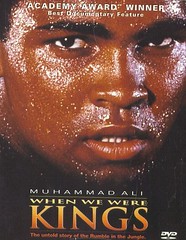What is the true measure of an artist? Is it his work? The legacy he leaves after his passing? The way he treats his contemporaries? The way he wears an angora sweater?
Johnny Depp plays Edward D. Wood Jr, a writer trying to make his mark on the artistic landscape. During the day he shleps around plants for the scenery department of a major Hollywood studio. At night, he's trying to get press for a play he's written starring his girlfriend Dolores (
Sarah Jessica Parker) hoping to make that break to the big time. The problem is that Wood's weakness happens to lie in his writing and artistic vision. This is countered by a seemingly eternal fountain of optimism. Only Ed could take the fact that the sole positive line in his play's review was that the costumes looked authentic, and turn that into a celebration of the play's realism.
Ed sees a golden opportunity come to him though when a gossip blurb in
Variety catches his eye. A low budget film studio has obtained the rights to do a movie about Christine Jorgenson, the first prominent male to female sex change operation recipient in the US. Wood makes a pitch to the head of the studio that he is the perfect person to direct this movie. When asked why, Wood states that he has a unique insight that allows him to better understand the motivation for Jorgenson to do what she did: he likes to dress up in women's clothing.
As absurd a premise as this sounds for the start of a film, you'd almost think Wood himself were shooting his own biopic. Yet Tim Burton's opus to the man widely cited as the worst film director of all time takes a subject that might have been relegated to tabloid or cult status and elevates it by getting in touch with Wood's humanity.
The most compelling examples of this is seen through the friendship Wood develops with fading film star Bela Lugosi (
Martin Landau). Never able to escape typecasting after his career making role in
Dracula, Lugosi is a shell of a man when Wood encounters him. Addicted to morphine, Lugosi has resigned himself to a death in relative obscurity. Wood helps revive Lugosi with a chance to star in his Jorgenson film, which Wood ultimately turns into a feature that allows him to talk about his cross dressing issues. The feature
Glen or Glenda tackled a topic that was extremely taboo at the time, even as it highlighted Wood's near complete lack of talent in film.
The lack of talent and cross dressing is secondary to Wood's character as Burton draws him. Directing from an excellent screenplay by
Scott Alexander and
Larry Karaszewski (who later joined to co-author
The People vs Larry Flynt), Burton makes Wood a very sympathetic character who wants only to tell stories and look out for the people he cares about. His friendship/idol worship with Lugosi is equal parts beautiful, funny, and in the end very tragic. Depp's performance as Wood would steal the show in any other film were he not paired up with Landau.
Landau won the Oscar for Best Supporting Actor for this role, bringing Bela Lugosi back to life in a way that takes me by surprise every time I see it. Makeup master Rick Baker also won an Oscar for his contribution to turning Landau into Lugosi, an award that is well earned. It's Landau's performance that breaths life into Baker's physical work. Landau spent extensive time studying all the film of Lugosi he could get his hands on. Every second spent studying comes through on the screen when Lugosi is present. By the end of the film, he just breaks your heart.
Wood does a good portion of heart breaking as well. From the travails through his second feature
Bride of the Monster, which saw the end of his relationship with Dolores, through his most infamous work
Plan 9 from Outer Space, Wood is the picture of a man whose reach exceeds his grasp. Wood genuinely just wants to tell a story and give some work to people he thinks really deserve it. It's a testament to his determination that he never loses faith, constantly pushing in the face of adversity. I feel sorry for him not having the talent to make all that go for something more than objects of ridicule.
All of the supporting roles are well played. Bill Murray has a few good quiet moments as Ed's friend and press agent Bunny Breckinridge. Jeffrey Jones is fun as faux psychic prognosticator Criswell. Sarah Jessica Parker does nicely as Wood's beleaguered girlfriend, coping with material from him better suited to one of
Parker's later efforts.
But the movie begins and ends with Depp and Landau as Wood and Lugosi. There are so many moments in the movie where you don't know whether they should be making you laugh or cry. Both actors are at the top of their game, and the movie is worth watching just for those two alone. Combined with Burton directing one of his best films and the obvious love of Wood's kitschy sensibilities makes this a fun film to watch and enjoy.





